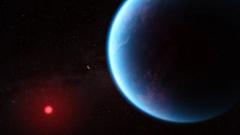In a groundbreaking discovery, scientists at Cambridge University have uncovered potential signs of life on the exoplanet K2-18b, located about 700 trillion miles from Earth. Utilizing data from NASA's James Webb Space Telescope (JWST), researchers have identified evidence of molecules in the planet's atmosphere that are typically produced by simple life forms on Earth. This marks the second time that life-associated chemicals have been detected in the atmosphere of K2-18b, providing hope for the existence of extraterrestrial life.
According to Prof. Nikku Madhusudhan, the lead researcher, the findings offer what could be the strongest evidence yet pointing to the possibility of life beyond our planet. He expressed optimism about confirming these signals within the next one to two years, stating, "If we confirm that there is life on K2-18b, it should basically confirm that life is very common in the galaxy."
K2-18b is two and a half times larger than Earth, and the JWST is capable of analyzing its atmospheric chemical composition by studying light passing through it. The Cambridge team detected significant amounts of dimethyl sulfate (DMS) and dimethyl disulfide (DMDS), gases linked to life on Earth through marine phytoplankton and bacteria. Prof. Madhusudhan emphasized the unexpected high concentrations of these gases during their observations, which, if validated, suggest a thriving ecosystem on the planet.
However, researchers caution that more data is necessary to substantiate these claims. The recent detection, while exciting, does not yet meet the scientific rigor needed for a definitive discovery, as the certainty level is currently at 99.7%—considerably below the required 99.99999% threshold known as a five-sigma result. There are also alternative explanations for the presence of these molecules, as highlighted by independent experts, including the possibility of geological processes that might produce similar gases.
The implications of confirming life on K2-18b could have far-reaching consequences for our understanding of the universe and the prevalence of life beyond Earth. Prof. Madhusudhan concluded that the current period in science could be pivotal, potentially allowing humanity to answer one of its most profound questions regarding existence in the cosmos. The research findings have been published in The Astrophysical Journal Letters, igniting further scientific discourse on K2-18b's atmospheric composition and the possibility of life elsewhere in the universe.
According to Prof. Nikku Madhusudhan, the lead researcher, the findings offer what could be the strongest evidence yet pointing to the possibility of life beyond our planet. He expressed optimism about confirming these signals within the next one to two years, stating, "If we confirm that there is life on K2-18b, it should basically confirm that life is very common in the galaxy."
K2-18b is two and a half times larger than Earth, and the JWST is capable of analyzing its atmospheric chemical composition by studying light passing through it. The Cambridge team detected significant amounts of dimethyl sulfate (DMS) and dimethyl disulfide (DMDS), gases linked to life on Earth through marine phytoplankton and bacteria. Prof. Madhusudhan emphasized the unexpected high concentrations of these gases during their observations, which, if validated, suggest a thriving ecosystem on the planet.
However, researchers caution that more data is necessary to substantiate these claims. The recent detection, while exciting, does not yet meet the scientific rigor needed for a definitive discovery, as the certainty level is currently at 99.7%—considerably below the required 99.99999% threshold known as a five-sigma result. There are also alternative explanations for the presence of these molecules, as highlighted by independent experts, including the possibility of geological processes that might produce similar gases.
The implications of confirming life on K2-18b could have far-reaching consequences for our understanding of the universe and the prevalence of life beyond Earth. Prof. Madhusudhan concluded that the current period in science could be pivotal, potentially allowing humanity to answer one of its most profound questions regarding existence in the cosmos. The research findings have been published in The Astrophysical Journal Letters, igniting further scientific discourse on K2-18b's atmospheric composition and the possibility of life elsewhere in the universe.








